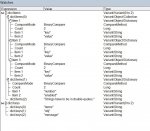- Local time
- Today, 14:38
- Joined
- Jan 23, 2006
- Messages
- 15,574
Note: This has also been posted at
http://www.accessforums.net/showthread.php?t=63480
I have searched but can not find a clear example for iterating over a dictionary object. The dictionary contains different object types.
There are 3 item(s) in the dictionary/object
DictItems(0) is a Collection called <items> with 3 element(s)
DictItems(1) is a Dictionary called <obj> with 2 element(s)
DictItems(2) is a String called <message>
My goal is to iterate over the dictionary and report/process each of the elements in each of the Items.
I'd like the solution to be sufficiently generic in that keys and values can be determined via the vba code.
I am attaching a jpg showing the watches related to the dictionary object I am testing with.
If you have a sample showing a vba procedure for iterating over a dictionary, or a link to same or a tutorial, or have some ideas on approach, I would appreciate any suggestions.
Thanks in advance.
http://www.accessforums.net/showthread.php?t=63480
I have searched but can not find a clear example for iterating over a dictionary object. The dictionary contains different object types.
There are 3 item(s) in the dictionary/object
DictItems(0) is a Collection called <items> with 3 element(s)
DictItems(1) is a Dictionary called <obj> with 2 element(s)
DictItems(2) is a String called <message>
My goal is to iterate over the dictionary and report/process each of the elements in each of the Items.
I'd like the solution to be sufficiently generic in that keys and values can be determined via the vba code.
I am attaching a jpg showing the watches related to the dictionary object I am testing with.
If you have a sample showing a vba procedure for iterating over a dictionary, or a link to same or a tutorial, or have some ideas on approach, I would appreciate any suggestions.
Thanks in advance.


